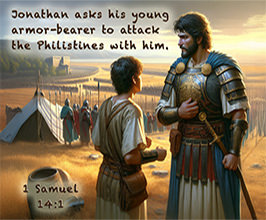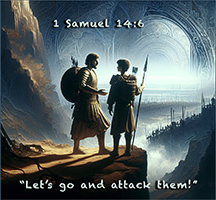1 Samuel 14:1–14 . . . Bible Study Summary with Videos and Questions
“Saul, Contrasted with Jonathan”
As we saw in last week's discussion of Israel's "warring without weaponry" (shown in our summary of 1 Samuel 13:1–23), armed with courage and trust in God, Jonathan ventured out to destroy Israel's enemy, in obedience to God's command to drive out the inhabitants of Canaan (cf. 9:16). He'd have made a great king of Israel. Saul remained in Gibeah, evidently on the defensive. His comfortable position under a fruit tree in secure Gibeah, surrounded by his soldiers, contrasts with Jonathan's vulnerable and difficult position of fighting the Philistines with the support of only his armor-bearer. Jonathan was launching out in faith to obey God while Saul was resting comfortably, failing to do God's will.
In today's study, we'll see that, in contrast to Saul, Jonathan had a true perception of God's role as the leader and deliverer of His people (v. 6). He viewed the Philistines as unbelievers under divine judgment. He believed that God would work for his people in response to their faithfulness in him, as he'd done repeatedly in Israel's history. Jonathan had also learned that superior numbers weren't necessary for God to give victory in battle (cf. 17:47). His name means "The Lord Has Given," which is what he claimed in v. 10: "The Lord has given [the Philistines] into our hands."
To fully appreciate Saul's participation, or lack thereof, in chapter 14, we need to review who and what Saul was in preceding chapters, especially in chapter 13. Then we can effectively compare, in this chapter, the leadership capabilities and accomplishments of Saul and his son Jonathan.
[Note: Click the link to This Week’s Passage near the bottom of this page to read today’s Scripture.]
Saul’s Reluctance, Jonathan’s Understanding (14:1–14)
You might have already realized that the more you read about Saul, the less you like him. Let’s review what we've already been told about him. In chapter 8, the people demanded a king. In chapters 9 and 10, Saul was divinely designated to become Israel’s king. Further, Saul was divinely enabled to serve as king because the Spirit of God had come upon him.
Israel demanded a king who'd deliver them from their surrounding enemies the same way the judges had done before, so long as Saul and the nation trusted in God and obeyed his commandments. The Spirit of God came upon Saul, as the Spirit had come upon Samuel and others, to enable him to lead the Israelites victoriously against their enemies. Once the Spirit came upon him, as Samuel instructed him, he was to take appropriate actions, trusting that God was with him in delivering Israel from the enemies around them.
From all accounts in chapter 10, Saul wasn't a spiritual man. Although Samuel was known to Saul’s uncle (10:14–16) and to his servant (10:9–10), he apparently was unknown to Saul, albeit in a day when prophecy was extremely rare (3:1). The circuit on which Samuel traveled, at its most distant point, wasn't much more than 15 miles from Saul’s home town, Gibeah. And Samuel’s home town of Ramah was approximately 3 miles from Gibeah. How can a "spiritually sensitive" man not have known about Samuel?
Sadly, the situation only worsened. We know that, regarding the threat to Jabesh, in Gilead, Saul felt “forced” to act, using an army that consisted of 330,000 Israelites. Once the Ammonites were defeated, Saul failed to continue driving out the Philistines, which, after all, was what he'd been appointed to do. Instead, he sent those soldiers home, keeping only a skeleton standing army of 3,000 men whom he'd divided into two companies. It was as though Saul didn't want to take on the Philistines; he willingly accepted living with the status quo. It wasn't Saul’s initiative, but his son Jonathan's, that brought about the confrontation with the Philistines, eventually leading to their defeat.
It should be clear why Samuel made such effort to remind the Israelites that it had always been their God who delivered them from their enemies. And it's no wonder that Samuel called the nation to repentance for its placing too much faith in their worldly king, rather than in their spiritual God. Chapter 13 focuses on the nation Israel and the threat of the Philistines who'd not only occupied Israel but threatened to destroy it. Chapter 14 focuses on Saul and his son Jonathan in a way that takes up the author’s contrast of both men, which begins in chapter 13.
Our author brings out obvious contrasts between Saul and Jonathan. The nation Israel was at war, desperately outnumbered and miserably equipped. Despite the severity of their condition, Saul was lounging under “the pomegranate tree is in Migron” (14:2). While he stayed out of the sun — and safely out of reach of the Philistines — his son Jonathan was about to take on more Philistine soldiers, accompanied by one man only, his armor-bearer. This foray was a private one for Jonathan: He didn't ask permission from his father, nor did he inform him of his plan; neither did he let anyone else know of his departure. While Saul didn’t want to cause trouble for the Philistines, Jonathan no longer wanted Israel to be troubled by the Philistines.
As we discovered in last week's study, Saul had one of only two swords in all of Israel (13:22). With Saul was Ahitub, brother of Ichabod, son of Phinehas, grandson of Eli (v. 3). Ahitub wore (or carried with him) the ephod, a resource for discerning the will of God (see 23:9–12; 30:6–8). Saul didn't get instructions from Samuel at Gilgal because of Saul's disobedience (13:1–14); now that Saul had access to the ephod and a priest, he ought to have utilized both facilities but didn't. He never inquired of God as to what to do!
However, Jonathan had a definite sense of God's will; it prompted him to take action. He learned much about God's will from Israel’s history and from the nature of God himself. His words to his armor-bearer were filled with a sense of faith and duty, expressing and documenting his confidence and action, thereby undergirding his armor-bearer's loyalty (v. 6).
The covenant that God had made with Israel assured them of his presence and his protection from their enemies. He brought them out of Egyptian slavery, promising to give them the land of Canaan and freedom from all surrounding nations. Such an idyllic state certainly wasn't in place for Israel during this very challenging time. Not only had Philistine garrisons occupied the land, the Israelites couldn't even farm without buying tools that the Philistines sharpened for them. Clearly, Jonathan understood very well that God didn't intend for his people to be enslaved by surrounding nations. He also understood that it was now the king’s responsibility to lead the people into battle against Israel's enemies.
What's more, Jonathan understood from God’s nature and from Israel’s history that Israel’s victory wasn't dependent upon the the number of troops or the kind and extent of weapons they possessed. (God had given Israel victory over the Midianite army, under Gideon, when he led his 300 men into battle [see Judges 7]). In Jonathan's mind, if it was God’s will for Israel to prevail over her enemies, it wouldn’t require 600 men — perhaps only two could do that job. The question in Jonathan’s mind wasn't whether God could deliver the Philistines into Israel's hands, but whether that outcome was in God’s will. Saul had the priest and the ephod, but was reluctant to inquire of God, preferring instead to sit under a shade tree. As a result, Jonathan determined a way to discern God's will with regard to his intended foray against the Philistine garrison (vv. 8–10).
8Jonathan said, “Come on, then; we will cross over toward them and let them see us. 9If they say to us, ‘Wait there until we come to you,’ we will stay where we are and not go up to them. 10But if they say, ‘Come up to us,’ we will climb up, because that will be our sign that the Lord has given them into our hands” (1 Sam. 14:8–10).
So Jonathan sought a sign from God that would hopefully help him determine whether he and his armor-bearer should attack the Philistines. Mikmash and Gibeah were two high points in that area. Access to Mikmash was through its very narrow pass. The Philistines seem to have had a small company of soldiers stationed at the top of that pass where they could spot intruders and stop them. Jonathan’s plan was to scale down the rocky face of one crag and make his presence known to the Philistines stationed atop a crag on the other side of the narrow pass. If the soldiers indicated that they'd go down to attack Jonathan and his armor-bearer, the two wouldn't attempt to go up the crag toward the Philistines on the other side. If, however, the Philistines challenged them to come up, such a challenge would be the sign to both men that God wanted them to make the dangerous climb up to the Philistine outpost and that he'd give Israel victory over them.
Fully supported by his armor-bearer, Jonathan made himself visible. The Philistine lookouts spotted them and supposed that they'd come out of hiding in the rocks. When they invited the two men up, Jonathan and his armor-bearer received that offering as God’s sign that he'd grant them victory in that engagement. So, atop the Philistine's crag, Jonathan began to wield his sword against them; those left alive behind him, his armor bearer slaughtered. Within a short time, this Philistine lookout squad of twenty men was dead (v. 14). It then became possible for the Israelites to traverse through Mikmash Pass to pursue the Philistines who'd become struck with panic, which we'll explore in next week's summary of 1 Samuel 14:15–52.
A hearty application to make As Christians, we ought to draw at least four principles from today's passage that contrast Saul and Jonathan.
1. Leadership: Saul was a big man of little faith. The word “fear” seems to better characterize him: He was afraid to tell his uncle that Samuel had anointed him as king of Israel; he hid amid luggage when he knew he was to be publicly selected as the king; fearing that he'd lose all his troops, he forced himself to offer burnt offerings; and he seems to have been so afraid to take on the Philistines that he did as little as possible to attack or provoke them.
Jonathan was a man of much faith: He trusted God to give him victory over the Philistine garrison in chapter 13; he was willing to take on the Philistines atop Mikmash Pass when it involved scaling a rocky crag with his armor, accompanied only by his servant; he was a man who trusted God, regardless of the odds; and he was a man whom his armor-bearer was willing to follow into battle, even when it appeared suicidal.

2. The Success of Leaders: When leaders succeed, it's ultimately due to the grace of God. Often it may be the result of the faithfulness of others whose supportive ministry isn't nearly so evident. In our follow-up study of part-2 of chapter 14, we'll learn of the success of Saul’s leadership (14:47–48), having come primarily from God's grace, not Saul's skills, courage, or greatness.
3. Faith and Action: By contrast, Jonathan and Saul illustrate the way faith should behave. Faith is sometimes evident by our waiting, rather than by our working. Saul should have waited, rather than worked at offering burnt offerings. When there's no apparent way for us to work in faith and obedience, we should wait for God to work in one or more ways that provide for our needs. Saul, who couldn't wait for Samuel (though commanded to do so), was more than willing to wait to rid Israel of their bondage to the Philistines. He ought to have taken action through requisite faith, but he chose to wait.
4. Impossible Missions: Here (and elsewhere) God purposefully brought his people into circumstances that seemed impossible in order to make it perfectly clear that we can't save ourselves; God delivers us in ways that bring him all the glory for doing so. He loves to show his strength through our weaknesses. Chapter 13 shows Israel and Saul in all their weakness. The Israelite soldiers were vastly outnumbered by the Philistines and desperately outclassed in terms of their weaponry. In spite of what appeared to be a hopeless situation in that situation, and in today's confrontation on a crag in Mikmash, God brought about a significant victory over the Philistines because two men (one without a sword) trusted God enough to take on twenty armed Philistines.
Many Christians seem to have an adequate amount of faith when victory appears possible through human effort. But, when circumstances appear impossible, they collapse. We should learn from Jonathan that God’s victory isn't contingent upon our strength but his.
† Summary of 1 Samuel 14:1–14
These fourteen verses highlight the bold faith and initiative of Jonathan, Saul’s son, during a time when Israel’s army was in hiding, fearful of the Philistines. Jonathan, without informing his father, decides to take a daring risk and proposes a test of God’s help by approaching the Philistine outpost with his armor bearer. He confidently says, “Perhaps the LORD will work for us, for nothing can hinder the LORD from saving, whether by many or by few” (v. 6). They quietly climb up a strategic pass guarded by sharp rocks and surprise the Philistine garrison.
The Philistines taunt Jonathan and his armor bearer, but Jonathan responds with faith and courage, leading to the killing of about twenty Philistines in a small area. This small victory sparks panic among the Philistines, foreshadowing a larger breakthrough for Israel. Jonathan’s faith-driven actions contrast with the fear and disobedience seen earlier in Saul’s leadership, emphasizing the power of trust in God and boldness in action (vv. 1–14).
Key points with verse references:
• Jonathan and his armor bearer take the initiative, leaving the army’s hiding place without Saul’s knowledge (vv. 1–3).
• Jonathan proposes a test of God’s deliverance based on the Philistines’ reaction (v. 6).
• They climb a strategic pass between two sharp rocks to surprise the Philistine camp (vv. 4–5).
• Despite being taunted, Jonathan boldly attacks, resulting in about twenty Philistine casualties (vv. 11–14).
• Jonathan’s faith and courage exemplify reliance on God even in the face of overwhelming odds (vv. 6, 14).
This Week's Passage
1 Samuel 14:1–14
New International Version (NIV) [View it in a different version by clicking here; also listen to chapter 14 narrated by Max McLean].
† Summary Video: “The First Book of Samuel”
† Watch this introductory video clip created by BibleProject on bibleproject.com.
- Q. 1 What obstacles did Jonathan and his armor-bearer have to overcome to be victorious? What role did faith play in that?
- Q. 2 Why do you think Jonathan felt so confident of God's blessing?
- Q. 3 What "cliffs" do you think God would have you climb for him? How does your response to life's obstacles compare with Jonathan's?
- Q. 4 What would it take for your Christian walk to be characterized by "expectancy"?


